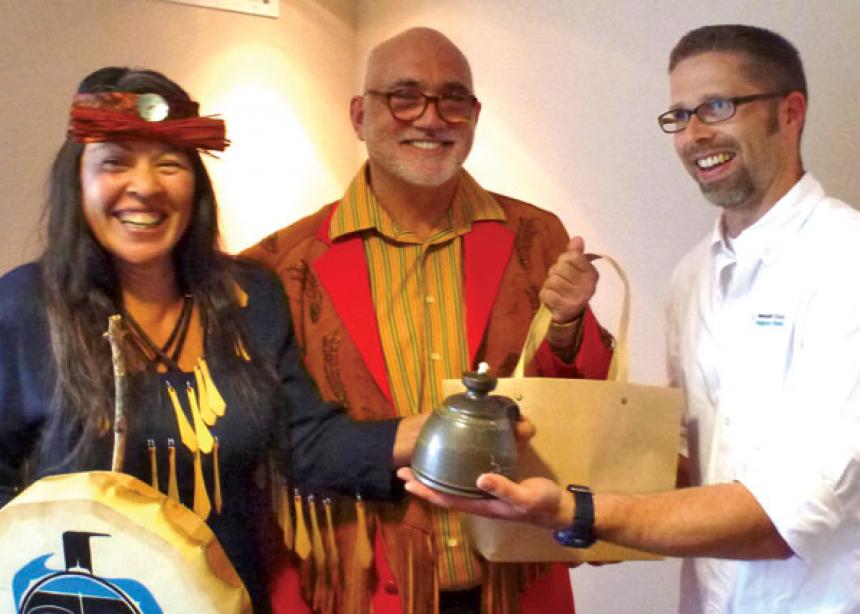She wept as she told her gripping story of being criminalized by the Canadian government for exercising her indigenous rights to fish from the Fraser River. And she drummed a prayer for “indigenous” Mennonites attending the overflow “Sacred Scripture in Invaded Space” Assembly workshop as she appealed for help in fighting a lonely battle in the courts for the past decade.
“How would you feel if you were denied preparation of your indigenous food,” Patricia Kelly, whose Coast Salish name is Kwitsel Tatel, asked, wearing her traditional headdress while detailing her arduous journey in her own defence through the provincial court in Chilliwack, British Columbia. She came to the workshop at the invitation of Professor Anthony J. Hall of the University of Lethbridge who has written up her case and has served as an expert witness in the many court appearances. Hall was a guest of Steve Heinrichs, director of Indigenous Relations for MC Canada.
Hall reported that Tatel has been made to pay a high price for continuing the heritage of her ancestors in British Columbia by exercising her aboriginal right to fish even in the face of aggressive force by the RCMP and the federal Department of Fisheries and Oceans. “The DFO has sided with the farmers of domesticated fish in coastal waters,” he said, “but these fish farms have been the sources of infestation and sickness for the wild salmon populations.”
Tatel reported that her fight for her right to fish has cost the court an estimated $1 million, not to mention the number of times the DFO has harassed her for what they charge is the illegal possession of fish. DFO regulations confine fishing activities of Aboriginals from Thursday to Saturday, but in order to feed her family, from time to time, she has been forced to violate the code.
A single mother of two teenagers, Tatel has represented herself on in the legal proceedings, now fighting, with the help of Hall, to win her case under an the Rights and Title clause of the Royal Proclamation of 1763 Act. She has not received any monetary backing from federally or provincially-funded Aboriginal organizations who “unfortunately are sometimes subject to political manipulation by their paymasters,” according to Hall.
She could pay a $200 fine and be over her legal troubles, but she says such a cowardly act would betray her posterity by giving in to the federal Crown’s effort to deny and negate the viability of her people’s aboriginal fishery.
The tragedy of Kwitsel Tatel’s case is part of a larger dark narrative in Canada, writes Professor Hall in a well-documented case. “It is one small part of a dark process that is filling Canadian jails, especially in western Canada with disproportionately high numbers of Indian, Métis and Inuit individuals. This federal push to deny and negate rather than recognize and affirm aboriginal and treaty rights is part of a scandal of law enforcement marked by a stunning lack of protection especially for aboriginal women.”
In what appears to be a strategy of ongoing intimidation, Tatel told the Canadian Mennonite that she has been surrounded in her home by DFO agents repeatedly over the years, frightening her children, most times without cause. She has been followed and stalked after fishing trips with her relatives, once ending in her conducting a citizens’ arrest of them for harassment. Having had so many encounters, she knows several of the agents by their first names and has confronted them with their harassing techniques, all to no avail.
This is too high a price to pay for one individual, insists Hall. “Because of her alleged crime of harvesting and possessing wild salmon, Tatel has faced incarceration where she was subjected to the indignity of vaginal and anal inspections. Her picture appeared in Crime Stoppers. Having been branded as a criminal in Crime Stoppers and with requirements to appear in court almost 200 times in the last decade, her employment opportunities have been severely limited.”
Her next scheduled court appearance is scheduled for July 25 in the Chilliwack provincial court, according to Hall. “If you know of some Mennonites that would be willing and able to come out and ‘witness,’ that would be great, says Hall. “Just being there will make a real difference.”




Add new comment
Canadian Mennonite invites comments and encourages constructive discussion about our content. Actual full names (first and last) are required. Comments are moderated and may be edited. They will not appear online until approved and will be posted during business hours. Some comments may be reproduced in print.